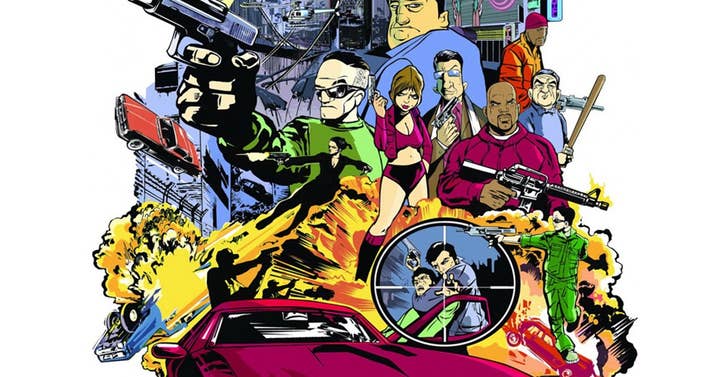The legacy of Grand Theft Auto 3: Grown-up video games and a template for the open world
Rockstar co-founder Jamie King reflects on the making of this iconic game, while industry professionals discuss its influence
On October 22nd, 2001, Grand Theft Auto 3 arrived on shelves for the first time. 20 years later, the industry is still feeling the impact.
Originally a top-down franchise, Grand Theft Auto's transition was inevitable. If anything, it was perhaps later than expected. While the likes of Mario, Sonic, Zelda, Metal Gear and other classic series had already made the jump, GTA 3 was somewhat behind this curve. Although, according to Rockstar co-founder Jamie King, the team was simply waiting for the right technology.
"From a storytelling perspective, [we knew] it would be much more immersive if you can actually get down to the streets and go 3D," he tells GamesIndustry.biz. "You couldn't really do it on a PlayStation, Dreamcast couldn't really do it -- you could maybe do fake 3D sort of isometric-ish stuff."
The development team at DMA Design, which would become Rockstar North after the release of GTA 3, had already experimented with 3D worlds. Nintendo 64 titles like Body Harvest and Space Station Silicon Valley show the kernels of ideas that would evolve in the open-world GTAs, and at the time GTA 3 was in development, the team was further experimenting with The Warriors, which was in its early stages at the time.
"And then the PlayStation 2 came out," King says. "They had vector units, and now we could actually run it."
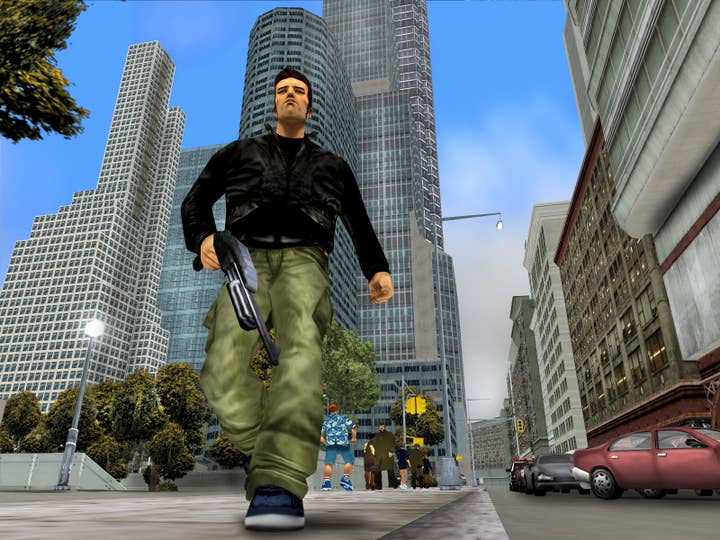
Building Liberty City
Grand Theft Auto 3 was not the first 3D open world, of course. There had been games set across an entire city before, with the likes of Driver and Midtown Madness -- the latter impressing Rockstar so much, it acquired it and brought the team on board to develop Midnight Club Racing. But Rockstar and DMA were determined to make something that was truly new and different.
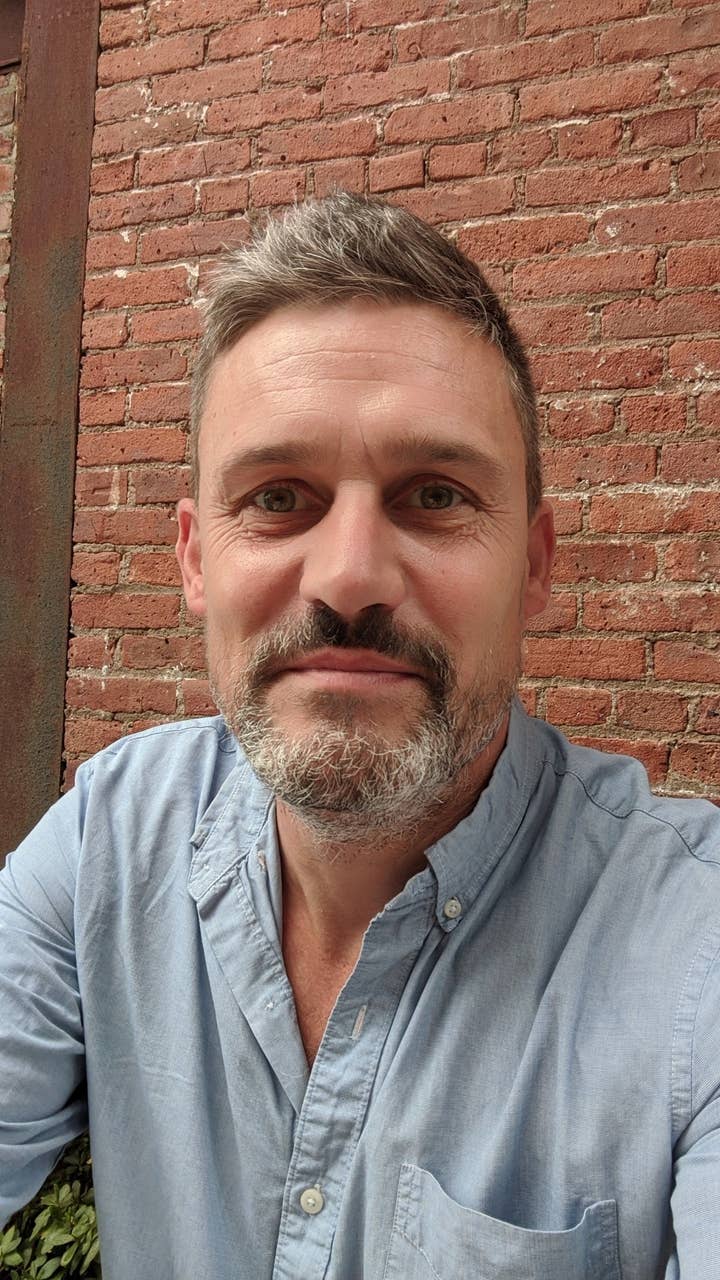
First it had to contend with the myriad challenges of bringing the staples of the top-down 2D games to a 3D open world. Animation was the big one, King says, as the team had to account for full body animations of removing someone from their car and climbing into the driver's seat -- a task that's considerably easier with 2D sprites.
Also, while the PS2's advanced hardware opened new possibilities, there was still the constraint of the console's 32MB RAM, which was addressed largely by the ability to stream content off the disc. This enabled Rockstar to make more use of pedestrian logic and all the other elements that create a living, breathing city, including packing in all the dialogue from passers-by and the famed radio stations, which King describes as "an incredible way to add depth and a richness of texture that extends beyond just the physical map."
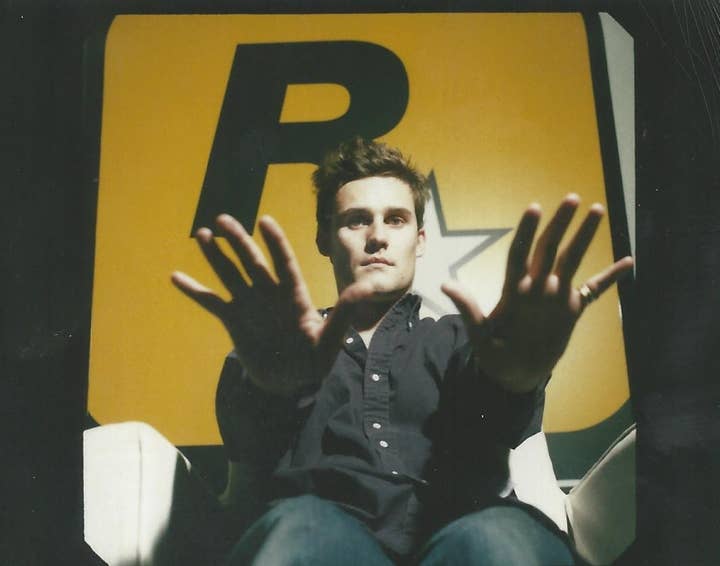
DMA also had to be careful with polygon counts and visual fidelity to ensure the game ran at 30fps, no matter how much chaos the player was causing.
"We wanted it to feel like there was something always going on around you and reacting to you," says King. "I remember frame rate was such an issue all the way along the run-up to release, and that was just the scale of the map and how much we were putting in it. It was really pushing the hardware.
"The driving was always something, too. We always got criticised about the car handling, everyone had an opinion on whether or not the cars handled well, but we always felt like the open world nature was taking us way beyond a driving game."
Crucially, Rockstar didn't want the first 3D Grand Theft Auto to be just another game. It wanted to build an experience, one more in line with other, more mature and accepted forms of entertainment.
"Sam [Houser] always saw this open world and Grand Theft Auto as a way to have the most interactive action movie that you could actually be part of and control"
Jamie King, Rockstar co-founder
"Sam [Houser, Rockstar co-founder and president] always saw this open world and Grand Theft Auto as a way to have the most interactive action movie that you could actually be part of and control," King remembers. "So there were a lot of references to film, storytelling and camera work. We paid a lot of attention to Sopranos and Miami Vice, cultural references for New York, and real world references like Donald Love. We grew up consuming American culture. When we were 11 years old we were watching things like The Warriors and Scorsese movies -- how could we convey that storytelling experience with an interactive element?"
A major part of this was the setting. Liberty City felt like a real place, more so than almost any video game world before it. While entirely fictional, those cultural references and familiar nods to the layout of New York City made it feel more authentic.
The fact that King, the Houser brothers and other members of the Rockstar team were based in New York helped. King recalls flying artists from DMA out to the US and having them take in all the detail and culture across Manhattan, Brooklyn, Bronx, and New Jersey -- areas for which they built equivalents in Liberty City.
Another major aspect was the scope. GTA 3 was about more than its main campaign. There were side missions to complete, secrets to find. Hijack a fire engine, ambulance or police car, and you could trigger missions that saw you responding to the relevant emergency. When you think about how much activity is crammed into the game, it's a marvel that the scope remained manageable.
"The guys at DMA were fucking studs," says King. "They really were an amazing group of talented people who pulled it together. We had a team in New York who focused on the cultural content -- from sourcing the music to making sure the car designs aren't falling foul of car manufacturers -- and we all worked seven days a week, very long hours. Back then, we loved what we were doing so much and it was very much like we were a small family with so much to prove to the world and we weren't there yet."
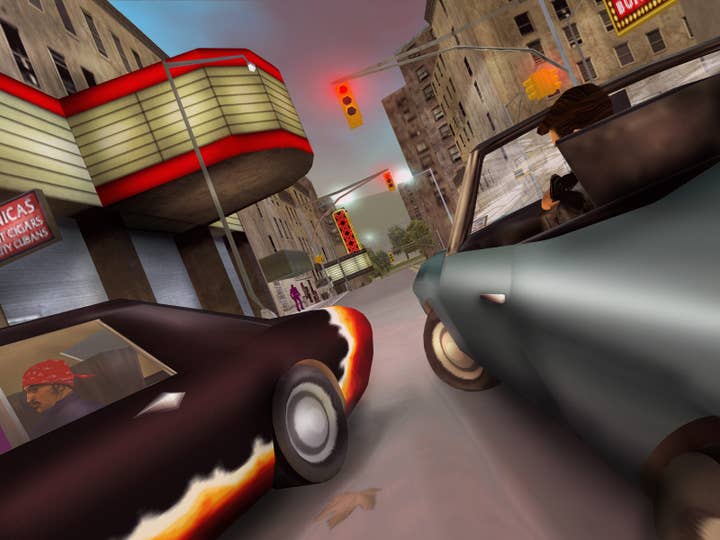
Herein lies the darker side of Grand Theft Auto 3 and its legacy. Its accomplishments are impressive, sure, but it's hard to ignore the role that crunch played in achieving them -- an issue the industry, and Rockstar Games, continues to face. King notes that the team was "obviously incentivised by great bonuses," but while he talks about working seven-day weeks with nostalgic enthusiasm, he recognises that the toll on individuals is not sustainable.
"I'd like to think we opened the doors to contemporary reality and that culture could be expressed in a much better way in a game"
Jamie King, Rockstar co-founder
"It's tricky, it's a very messy situation," he says. "From personal experience, the sacrifice is definitely sweetened when you get a big fat bonus and it makes you rich. But there is a point where [you wonder] what's the point in riches when you've had no life. When your family never sees you or you're unable to maintain decent relationships and you physically or mentally start burning out. Which is inevitable, there's only so long any human being can grind. It's a hard thing to sustain and you've got to have tremendous mental and physical stamina otherwise you do burn out: bitterness, mental health and emotional issues.
"It's a young person's game. In your 20s, you're trying to build your career, so [you] work late, work the weekends, because you don't have a family and you believe in it, and there's incentive... But it's really important to have time at the end of the day where you've given everything to go away and [refuel] the tanks. Experience life, take a break, let your emotions reset. There's a lot of elements to crunch that have negative consequences on dev teams. I'm in no hurry to go back to games development and that's one of the reasons. I don't miss any of that shit. I made a lot of money at Rockstar, but I also sacrificed a lot for something that, yeah, made me money but it was 95% of my life."
The game changes
In October 2001, Grand Theft Auto 3 launched to critical acclaim. The PS2 version stands with a Metacritic rating of 97, one of the highest rated games of all time.
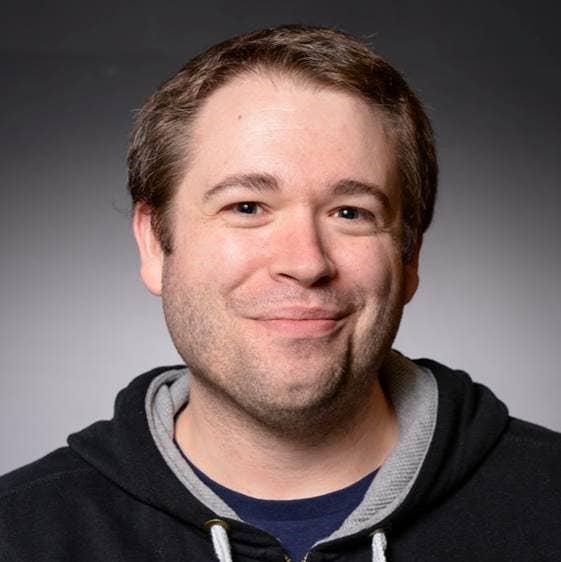
Tom Bramwell, games consultant and former editor-in-chief of Eurogamer, wrote the site's review back in the day and recalls the impact it had on him: "I was completely blown away by it. I played little else for months afterwards. I had been a Grand Theft Auto fan since the early DMA Design games, and in fact I started on my path to journalism by making GTA fan sites, and to see that vision realised in three dimensions for the first time felt magical."
Michael Pattison -- now CEO of Team17 Digital, then global brand management director at THQ -- also uses the term "blown away," specifically in regards to the "technical masterclass that was GTA 3."
"We talk a lot about developers getting the most out of the tech, but this was a monumental achievement and set a new high bar. It really asked the question, 'how much control can you give to the player?' It asked everyone to reconsider world-building, non-linear progression, use of music, building a brand, cool and edgy art, importance of story and pushed the boundaries of what might be viewed as acceptable within a game."
King says the team was "obviously thrilled" to see the reviews rolling in, especially after the hard work poured into the project: "You wait with bated breath for [review scores]. We were getting 10/10, 9/10 -- an 8/10 broke our hearts. But it was all very validating.
" I find it funny to play a game in 2021 and hit Y/triangle to get in a car or climb onto a horse because somebody in Dundee decided it should be that way in the late '90s"
Tom Bramwell, games consultant
"The day after it came out, we were talking about what we needed to do for Vice. There was no rest. Not in a bad 'you guys have to be working' crunch kind of way, more like excitement, 'let's go, go, go'. Even though we got all these accolades, a lot of us felt like we weren't done yet and we definitely didn't have any sense of resting on our laurels, putting our feet up and thinking 'yeah, we did it'."
But review scores only tell so much about a game's impact. To truly understand how successful a game has been, you must look at the influence it has had on subsequent titles.
Given the acclaim and high sales of GTA 3, it was perhaps inevitable that similar titles might emerge. "Like GTA but..." could describe a great many titles of the following generations: Saints Row, Watch Dogs, Crackdown, The Getaway, True Crime, Mafia, Lego City Undercover, The Simpsons: Hit 'N' Run -- the list goes on.
Even superhero games of the PS2 generation, such as Spider-Man 2 and The Incredible Hulk: Ultimate Destruction, tried to capture the open world magic. In fact, squint hard enough at almost any open world game and you can still see the formula laid out by Rockstar's 2001 masterpiece.
Ampere Analysis' games research director Piers Harding-Rolls says GTA 3 has directly influenced a wide array of games, some more directly than others..
"The emergent gameplay employed in GTA 3 has sparked increasingly complex environments in other franchises over the years," he says. "Most open world games that are story-led follow this template, as that keeps the experience progressing. Many also have side missions which bulk out the main storyline experience.
"A couple of key developments that have had a significant impact on open world games is the introduction of sandbox features in the context of user-generated content and the more extensive use of AI for procedurally generated environments leading to massive environments for players to discover. Minecraft is the prominent example here, but No Man's Sky is also worth noting in this context."
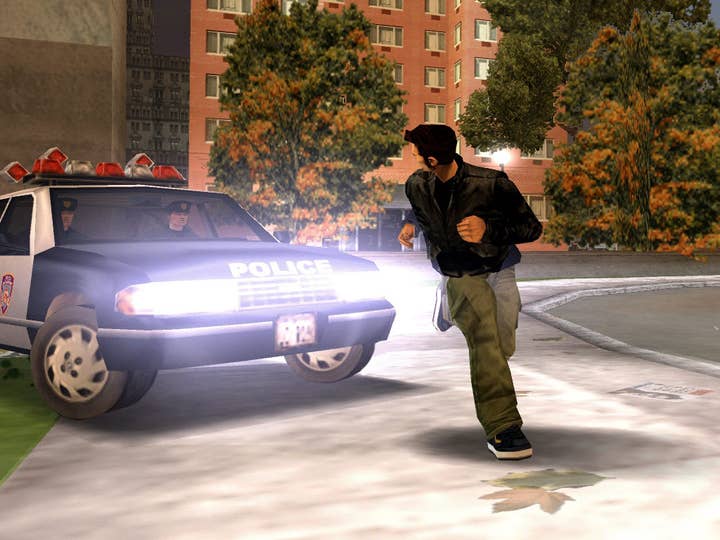
Bramwell agrees that there's some truth to the notion that many open-world games are built on GTA 3's foundation, but emphasises that GTA 3 didn't necessarily invent those building blocks.
"Instead, it brought them all together, but they existed in other forms in other games for the most part," he says. "One of the reasons they worked so well in GTA 3 is that they were tried and trusted. Also I think to some extent those decisions became baked into the genre because it made it easier for devs to onboard people to their own subsequent games if they already acted in a way GTA 3 literate players expected. For instance, I still find it funny to play a game in 2021 and hit Y/triangle to get in a car or climb onto a horse because somebody in Dundee decided it should be that way in the late '90s.

"The manner in which GTA 3 brought player freedom, open-world scale and storytelling designed primarily for adults together in one 3D setting was revolutionary. It had the non-linearity of games like Zelda and Metroid, but it also provided all sorts of opportunities to invent your own entertainment if the main quest didn't seem that appealing, and it did it in this in a quasi real-world setting in a decent facsimile of New York, with mafia trimmings and so on.
"It set a baseline expectation for what open worlds should offer, in the same way Mario 64 laid the groundwork for a generation of 3D platform games."
Pattison says GTA 3 "set the standard" and Rockstar has continued to raise this level of quality in a way in which he argues no one has been able to reach.
"We have seen developers look to build bigger worlds, to focus on richness and depth of both the ecosystem and the worlds, trying to deliver more meaningful encounters as well as introducing moments between the moments, coupled with more outlandish gameplay possibilities. Allowing players to experiment with the 'what if I do this' play possibilities, introducing control over the landscape, the list goes on but a lot of it can be traced back to GTA 3.
"The honest truth is that GTA3 can still hold its head up high, despite everything that has come since. If it wasn't for GTA 3 then who knows whether the explosion in open-world gaming would have happened or be where it is today."
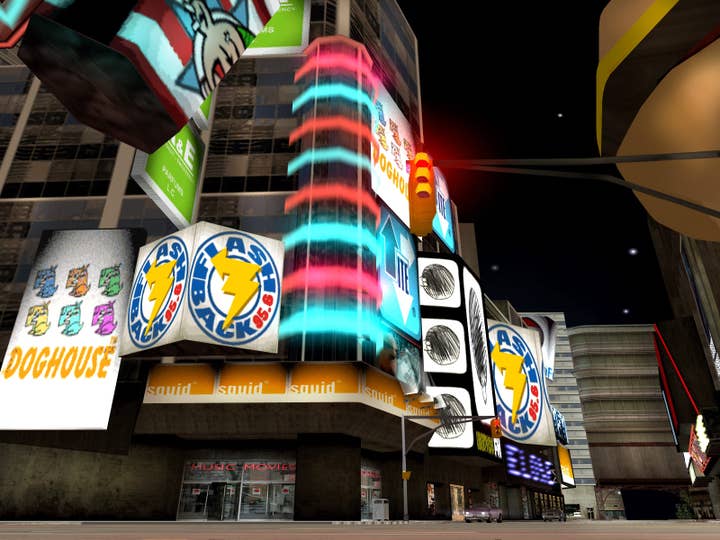
Conversation starter
For King, the greatest legacy Grand Theft Auto 3 leaves is not its influence on games design, but its influence on the wider world and the way video games are viewed.
"Back then, there was a lot of stigma around video games," he explains. "They were for children, or they were weird things built by socially inept, awkward nerds and geeks, and it was very insular and slightly immature. And it wasn't an art form, and not as cool or impactful or emotionally fulfilling as a play or a book.
"The emergent gameplay employed in GTA 3 has sparked increasingly complex environments in other franchises over the years"
Piers Harding-Rolls, Ampere Analysis
"One of the big motivations for us was that video games can be for grown ups, video games can be cool, and there was a desire to regurgitate a lot of the culture we'd consumed from America and the UKand express that back in something contemporary where you're not just shooting down aliens and you're not just driving, but it was more like a Hollywood action movie.
"We wanted a sense of tone and style and edginess and maturity, which set us up for an amazing conversation with parents and ratings boards, and about content and freedom of speech. We wanted the rest of the entertainment industry to pay attention -- we're not nerds, and even if we are nerds, we actually understand culture and what we're making is incredible from an experience perspective, and you need to pay it respect. I'd like to think we opened the doors to contemporary reality and that contemporary culture could be expressed in a much better way in a video game. That you could also make mature content that wasn't just crazy kills in a Mortal Kombat-type beat 'em up. That there was room for grown up, adult discourse that's being expressed visually and creatively.
"For a while, we were the poster child for everything that was wrong. We were getting letters saying we should be taken out into the street and stoned to death. We had Jack Thompson and so on... but now there's no question that every parent knows there's an ESRB rating and that they need to pay attention, and that some games have content that isn't appropriate for an 11-year-old. Although I would get incredibly articulate letters from 11-year-olds about how much they loved Grand Theft Auto."
Today, Rockstar Games has released The GTA Trilogy: Definitive Edition, revamped re-releases of GTA 3 and its two sequels, Vice City and San Andreas. While it's a moment for nostalgic adults to replay the games they remember from two decades ago, it's also a chance for new generations to discover the template for the open world games they play today.
It's one of the most anticipated releases of Q4, especially for Bramwell.
"I haven't played GTA 3 for years, so I'm curious to see for myself when the remake trilogy is released," he says. "I imagine it probably comes across as quite primordial by comparison [to Vice City and San Andreas] due to its lower production values. But in a way it's the one I really want to play again the most. Particularly as a GTA fan when it came out, it was a huge moment for that kind of game as well as a key milestone in the evolution of open-world games, whereas Vice City and San Andreas, for all the good things they did, were basically just expensive victory laps."
King, meanwhile, says that playing GTA 3 today can be a reminder of just how much video games shifted as an entertainment medium in the closing months of 2001.
"Up until that point, games had been very linear," he says. "The freedom of being able to grab a car, drive it somewhere, drop it off, shoot someone, get a Wanted rating but still being able to run around, people reacting to you -- it created this sense of enormous freedom and guilty pleasure, and that just had an effect on people that to this day I don't think they ever forgot."
